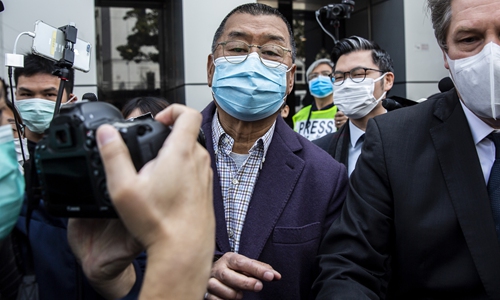
Hong Kong riot supporter Jimmy Lai (center) leaves the Kowloon City police station in Hong Kong on Friday after being arrested for taking part in an unauthorized assembly on August 31, 2019. Photo: AFP
The High Court of Hong Kong on Friday rejected the application by anti-government figure and Apple Daily founder Jimmy Lai to adjust his bail terms, allowing him to leave Hong Kong for the US. It's the second time his attempt to remove the travel ban has failed.
After the National People's Congress (NPC) adopted the decision to make a national security law for Hong Kong, Lai and other riot leaders, especially the "Gang of Four" who seemed aware of their sins, either tried to abscond the country or distance themselves from the secessionism which formed a sharp contrast with last year's actions of rushing to the frontline of riots, while some young radical secessionist leaders such as Joshua Wong Chi-Fung tried to seize their last opportunity to find themselves a path to the US by inciting more riots, experts said.
But they will be punished by law, experts said, while calling to accelerate the process of formulating the national security law.
The High Court judge dismissed the 72-year-old's application on Friday, and will provide written explanations when appropriate, Hong Kong media reported.
Lai was accused of six charges, including intimidating media reporters at Victoria Park in Causeway Bay on June 4, 2017, resulting in a travel ban as one of his bail conditions.
His trial is scheduled on August 19. If convicted, Lai could face a prison term of up to two years along with fines, Hong Kong media reported. Lai had applied to the High Court to remove the travel ban bail conditions on May 22, but withdrew his application.
Kennedy Wong Ying-ho, a solicitor of the Supreme Court of Hong Kong, told the Global Times on Friday that the court rejected his application most probably because of risks associated with Lai fleeing the region, and the gravity of the charges.
Lawrence Ma Yan-kwok, the chairman of the Hong Kong Legal Exchange Foundation, told Hong Kong media that Lai, who was supported by many US politicians, would have very likely escaped to the US if the courts removed his travel ban. Hong Kong media also reported that some defendants involved in last year's riots have made bail and fled to other countries.
It was also worth noting that Lai has been a long-term Hong Kong representative for the US and Taiwan, and it was possible that he may not return to Hong Kong after leaving, Wong said.
Wong said that Lai's recent application following the NPC's national security law decision showed that he fears the new laws, which target rioters who threaten national security.
He added that according to international conventions, if an individual is convicted of one of four criminal acts — secession, subversion, terrorist activities, and acts interfering in Hong Kong's internal affairs, that is, aiding foreign or external forces — they will face severe punishments. In the US, such activities could result in up to 40 years in jail.
Lai is a member of the "Gang of Four" along with Martin
Lee Chu-ming, Anson Chan Fang On-sang and Albert Ho Chun-yan, who have been criticized for using freedom and democracy as a front to split Hong Kong.
Just days before Lai's attempt to leave Hong Kong failed, Lee surprisingly softened his rhetoric against the legislation on Article 23 of the Basic Law, which allows the HKSAR government to improve its legal system when safeguarding national security.
Lee said on Sunday that democrat groups will back Article 23 as long as it does not harm "human rights and freedom," and also tried to distance himself from Hong Kong secessionists in an interview with Hong Kong media.
When some secessionists aware of their crimes trying to sneak out of the country through the so-called "green channel" created by external forces and some rioters trying to throw the flag of secessionists, radical secessionists including Joshua Wong Chi-Fung attempted to use students as their "tools" and "bullets" to obstruct the NPC to adopt the decision to make the national security law by launching school strikes for a referendum to defy the law, which only added more crimes to their list, the Hong Kong and Macau Affairs Office of State Council said on Friday.
Wong Ying-ho said that members of "Gang of Four" were more pragmatic than young radicals like Wong Chi-Fung in viewing the current situation. However, Wong Chi-Fung was too young and lost himself after becoming a pawn of the foreign forces, and he incited more riots so that he could get more support from the US and eventually flee there.
Although the national security law only targets a very extreme small group of people, the leaders of the riots and secessionists will be punished, Wong said.




